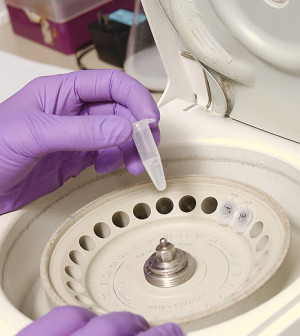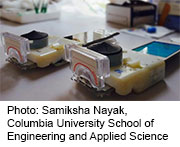- Could Your Grocery Store Meat Be Causing Recurring UTIs?
- Are You Making This Expensive Thermostat Error This Winter?
- Recognizing the Signs of Hypothyroidism
- 10 Strategies to Overcome Insomnia
- Could Artificial Sweeteners Be Aging the Brain Faster?
- Techniques for Soothing Your Nervous System
- Does the Water in Your House Smell Funny? Here’s Why
- Can a Daily Dose of Apple Cider Vinegar Actually Aid Weight Loss?
- 6 Health Beverages That Can Actually Spike Your Blood Sugar
- Treatment Options for Social Anxiety Disorder
Smartphone Device Detects HIV, Syphilis


A smartphone accessory that can detect HIV and syphilis has been developed by Columbia University researchers.
The low-cost device can spot markers of the infectious diseases from a finger prick of blood in 15 minutes. It’s the first smartphone accessory that replicates all the functions of a laboratory-based blood test, according to the researchers.
The device was tested by health care workers in Rwanda who used it to analyze blood samples from 96 patients. The health care workers were given 30 minutes of training on the device, and 97 percent of the patients had a positive response to the device.
The findings were published Feb. 4 in the journal Science Translational Medicine.
“Our work shows that a full laboratory-quality immunoassay can be run on a smartphone accessory,” team leader Samuel Sia, an associate professor of biomedical engineering at Columbia Engineering, said in a university news release.
“This kind of capability can transform how health care services are delivered around the world,” Sia added.
However, one expert was more cautious about the possibilities of the device.
“This is a new technology that uses smartphones to detect antibodies against HIV and syphilis. Although an encouraging development, there are significant limitations, such as comparison with confirmatory tests in standardized laboratories,” said Dr. Ambreen Khalil, an infectious disease specialist at Staten Island University Hospital, in Staten Island, N.Y.
Khalil noted that the device might work well in areas where it is hard to get adequate health care and medical resources are limited.
“It would be interesting to evaluate its performance in other settings as well,” Khalil said.
The device — called a dongle — is small and light enough to fit into a hand, uses little power and will cost about $34 to make, according to the researchers.
“Our dongle presents new capabilities for a broad range of users, from health care providers to consumers,” Sia said.
“By increasing detection of syphilis infections, we might be able to reduce deaths by 10-fold. And for large-scale screening, where the dongle’s high sensitivity with few false negatives is critical, we might be able to scale up HIV testing at the community level with immediate antiretroviral therapy that could nearly stop HIV transmissions and approach elimination of this devastating disease,” he added.
More information
The U.S. Centers for Disease Control and Prevention has more on HIV testing.
Source: HealthDay
Copyright © 2026 HealthDay. All rights reserved.










